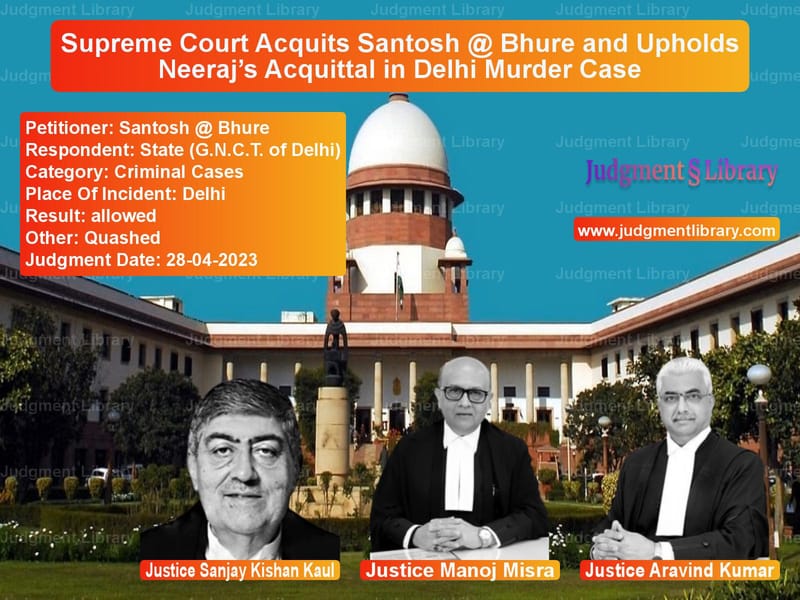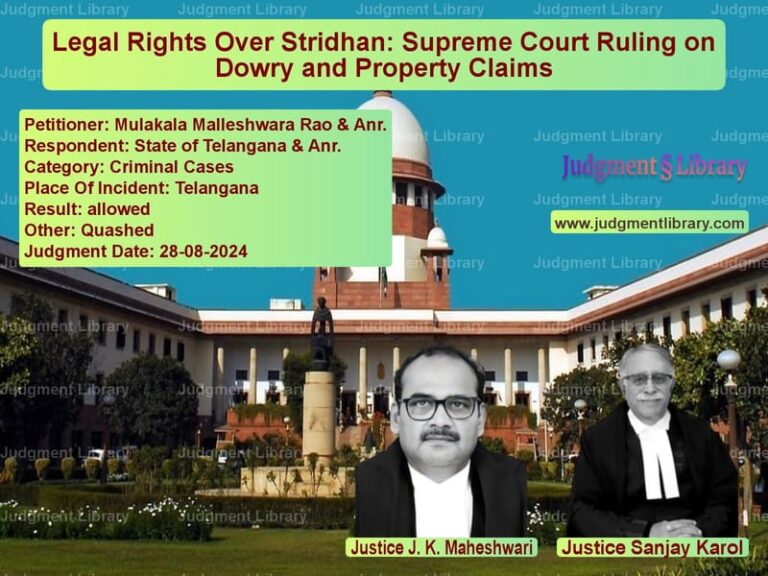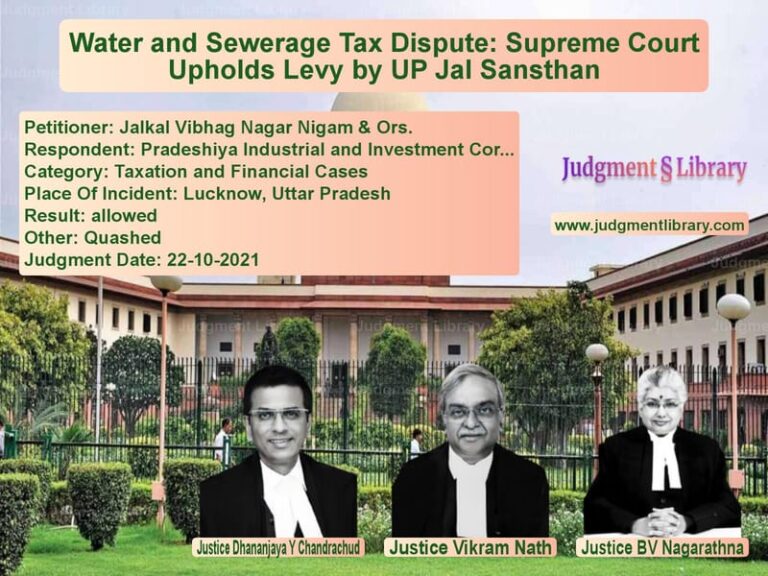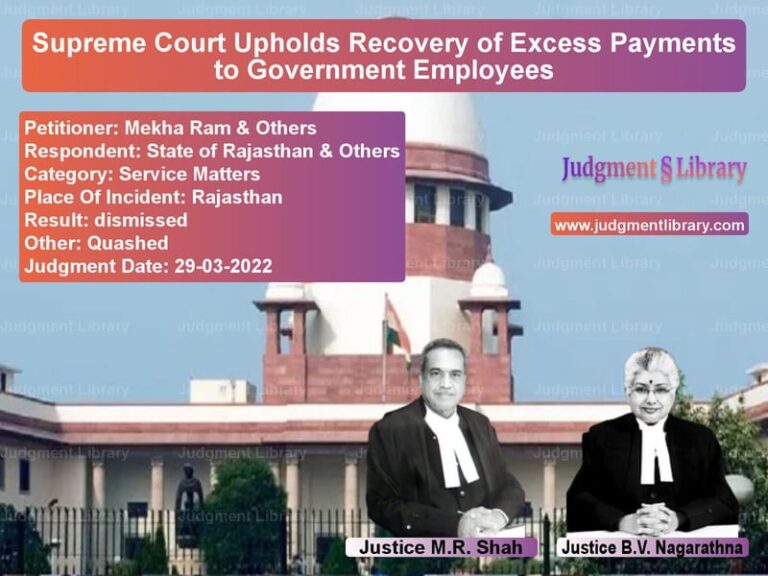Supreme Court Acquits Santosh @ Bhure and Upholds Neeraj’s Acquittal in Delhi Murder Case
The Supreme Court of India, in its judgment dated April 28, 2023, in Criminal Appeal No. 575 of 2011 and Criminal Appeal No. 576 of 2011, ruled on the conviction and acquittal of two accused individuals, Santosh @ Bhure and Neeraj, in a murder case from Delhi. The ruling affirmed the High Court’s decision to acquit Neeraj while overturning Santosh’s conviction, citing insufficient evidence to conclusively prove his involvement in the crime.
The case involved the murder of Hari Shankar, whose body was found in an apartment rented by Santosh @ Bhure on September 12, 2000. The police recovered a suicide note from the victim’s pocket, which was later attributed to Neeraj. The prosecution relied on circumstantial evidence, including forensic reports, witness testimonies, and alleged recoveries of blood-stained clothes and a knife.
Legal Proceedings
Trial Court’s Findings
The trial court convicted both Santosh and Neeraj under Section 302 read with Section 34 IPC but acquitted them of conspiracy charges under Section 120-B IPC. It based its decision on the following findings:
- Santosh was the tenant of the apartment where the body was found, making him responsible for explaining the crime scene.
- The alleged recovery of blood-stained clothes linked him to the murder.
- Neeraj’s handwriting on the suicide note suggested his involvement in misleading the investigation.
- The prosecution claimed that both accused had planned the crime together.
High Court’s Findings
The Delhi High Court later overturned Neeraj’s conviction and upheld Santosh’s conviction. It ruled:
- There was no conclusive evidence linking Neeraj to the crime.
- The suicide note, which was allegedly written by Neeraj, was obtained without proper legal procedures.
- Since Santosh was the tenant, he had knowledge of the crime.
Arguments by the Prosecution
The prosecution argued the following points before the Supreme Court:
- The location of the crime scene in Santosh’s rented apartment proved his involvement.
- Blood-stained clothes were recovered based on Santosh’s disclosure.
- The suicide note, attributed to Neeraj, was an attempt to mislead the investigation.
- A knife allegedly used in the crime was recovered based on Neeraj’s statement.
Arguments by the Defense
The defense raised the following objections:
- The mere presence of the dead body in the apartment did not establish Santosh’s guilt.
- The forensic report did not conclusively prove that the blood stains belonged to the victim.
- The recovery of the knife and clothes was fabricated.
- The handwriting expert’s report was unreliable as the sample was taken without judicial authorization.
Supreme Court’s Observations
The Supreme Court bench, comprising Justices Sanjay Kishan Kaul, Manoj Misra, and Aravind Kumar, examined the evidence and made the following key observations:
- “Mere presence of a dead body in an apartment is not enough to convict a tenant for murder, particularly when no evidence proves that he was present at the time of the crime.”
- “The prosecution failed to establish an unbroken chain of circumstantial evidence that pointed conclusively to Santosh or Neeraj as the perpetrators.”
- “The handwriting expert’s report on the suicide note was inadmissible as the sample was taken without judicial authorization.”
- “The recovery of the knife and clothes lacked credibility, as no independent witnesses supported the prosecution’s claim.”
Final Judgment
The Supreme Court ruled:
- Criminal Appeal No. 575 of 2011 (Santosh @ Bhure’s appeal) was allowed, setting aside his conviction.
- Criminal Appeal No. 576 of 2011 (State’s appeal against Neeraj’s acquittal) was dismissed.
- Santosh was ordered to be released immediately unless required in another case.
Implications of the Judgment
The ruling reinforces critical legal principles:
- Presumption of Innocence: A conviction cannot be based solely on suspicion or weak circumstantial evidence.
- Admissibility of Evidence: Expert reports must be based on legally obtained samples to be considered valid.
- Forensic Integrity: The recovery of evidence must be corroborated by independent witnesses to be credible.
Conclusion
The Supreme Court’s verdict in Santosh @ Bhure vs. State (G.N.C.T. of Delhi) underscores the importance of rigorous evidentiary standards in criminal cases. By acquitting both accused, the judgment reaffirms that criminal convictions must be based on conclusive and admissible evidence, ensuring fairness in judicial proceedings.
Petitioner Name: Santosh @ Bhure.Respondent Name: State (G.N.C.T. of Delhi).Judgment By: Justice Sanjay Kishan Kaul, Justice Manoj Misra, Justice Aravind Kumar.Place Of Incident: Delhi.Judgment Date: 28-04-2023.
Don’t miss out on the full details! Download the complete judgment in PDF format below and gain valuable insights instantly!
Download Judgment: santosh-@-bhure-vs-state-(g.n.c.t.-of-d-supreme-court-of-india-judgment-dated-28-04-2023.pdf
Directly Download Judgment: Directly download this Judgment
See all petitions in Bail and Anticipatory Bail
See all petitions in Murder Cases
See all petitions in Fraud and Forgery
See all petitions in Judgment by Sanjay Kishan Kaul
See all petitions in Judgment by Manoj Misra
See all petitions in Judgment by Aravind Kumar
See all petitions in allowed
See all petitions in Quashed
See all petitions in supreme court of India judgments April 2023
See all petitions in 2023 judgments
See all posts in Criminal Cases Category
See all allowed petitions in Criminal Cases Category
See all Dismissed petitions in Criminal Cases Category
See all partially allowed petitions in Criminal Cases Category







